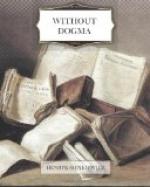I feel at home in Ploszow, it is so quiet and restful; and I like the huge, old-fashioned chimneys. The woods are to my aunt as the apple of her eye, but she does not grudge herself fuel; and big logs, which are crackling and burning there from morning until night, make it look bright and cheerful. We sat around the fire the whole afternoon. I brought out some of my reminiscences, and told them about Rome and its treasures. The three women listened with such devoutness that it made me feel ridiculous in my own eyes. From time to time, while I was talking, my aunt cast a searching glance at Aniela to see whether she expressed enough admiration. But there is too much of that already. Yesterday she said to me:—
“Another man might spend there his whole life and not see half the beautiful things you do.”
My aunt added with dogmatic firmness,—
“I have always said so.”
It is as well that there is not another sceptic here, for his presence would embarrass me not a little.
A certain dissonant chord in our little circle is Aniela’s mother. The poor soul has had so many sorrows and anxieties that her cheerfulness, if ever she had any, is a thing of the past. She is simply afraid of the future, and instinctively suspects pitfalls even in good fortune. She was very unhappy in her married life, and afterwards has had continual worries about her estate, which is very much involved. In addition to all this she suffers from nervous headaches.
Aniela belongs to that category of women who never trouble themselves about money matters. I like her for that, for it proves that she thinks of higher things. For the matter of that, everything in her pleases and delights me now.
Tenderness grows on the soil of attraction by the senses, as quick as flowers after a warm rain. To-day, in the morning, I saw the maid carrying up her gown and boots; this moved me very much, especially the little, little boots, as if the wearing of them was the crown of all virtues in Aniela.
PLOSZOW, 8 or 9 February.
My aunt has taken up her visual warfare with Pan Chwastowski. This is such an original habit of hers that I must describe one of their disputes. The dear lady can evidently not exist without it, or at least not enjoy her dinner; Chwastowski, again, who, by the bye, is an excellent manager, is a compound of brimstone and saltpetre, and does not allow anybody to thwart him; therefore the quarrels sometimes reach the acute state. When entering the dining-room they eye each other with suspicious glances. The first shot is fired by my aunt while eating her soup.
“It is a very long time, Pan Chwastowski, since I heard anything about the winter crops, and Pan Chwastowski, instead of giving me the information, speaks about anything but what I want to know.”
“They were very promising in autumn, my lady; now they are covered by a yard or two of snow,—how am I to know the state they are in? I am not the Lord Almighty.”




